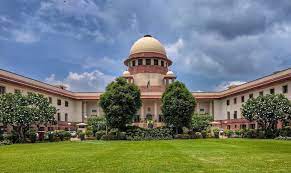Are directed against the common judgment and order dated 03.05.2019 passed by the High Court of Judicature at Allahabad in the Commercial Tax Revisions Nos. 315 of 2017 and 148 of 2018 respectively, by which the High Court allowed both the Commercial Tax Revisions filed by the revenue against the Orders dated 04.05.2016 and 05.07.2017 respectively passed by the Commercial Tax Tribunal, Bareilly Bench, Bareilly and thereby took the view that the assessee is not entitled to the full benefit of Input Tax Credit (for short, ‘ITC’) claimed on the goods purchased by it for manufacturing its final product. (Para 3)
The assessee claimed full amount of tax paid as ITC i.e., a sum of Rs. 4,68,47,670/-. The claim of the assessee came to be rejected vide the Order of the Deputy Commissioner, Tax Fixation, Div. – I, Pilibhit passed in terms of Section 28(2)(i) of the UP VAT Act. It is the case of the revenue that had the assessee been permitted to avail the full ITC, it would have led to a loss of Rs. 1,90,88,763.00 to the State exchequer. (Para 7)
Deputy Commissioner took the view that in terms of Section 13(1)(f), the assessee could have availed the ITC on the inputs only vis-à-vis the taxable sales, as the sale price of the final goods was lesser than the manufacturing cost of the purchased goods. In other words, according to the Deputy Commissioner the term “goods” in Section 13(1)(f) of the UP VAT Act means only the taxable goods. (Para 8)
The Incharge Additional Commissioner accepted the case put up by the assessee that the word “goods” in Section 13(1)(f) of the UP VAT Act cannot be restricted to only “taxable goods”. However, for the Assessment Year 2013-14, the Additional Commissioner proceeded to remand the matter to the Tax Fixation officer for passing the re-tax fixation order. (Para 8)
The High Court formulated the following substantial question of law for its consideration: “Whether under the facts and circumstances of the case, the Commercial Tax Tribunal was legally justified in granting the benefit of ITC of Rs. 1,90,88,763.00 which was reversed by the Assessing Authority?” (Para 11)
The High Court relying on Section 13(1)(f) of the UP VAT Act took the view that the assessee is not entitled to claim full ITC on the inputs. The High Court accordingly allowed both the revision applications filed by the revenue. (Para 12)
A bare perusal of the scheme under Section 13 of the UP VAT Act [and specifically under Section 13(1)(a)] makes it abundantly clear that in cases where the purchased goods (in the present case Rice Bran) are used in the manufacture of taxable goods (in the present case RBO and physically refined RBO) except the non-VAT goods, and where such manufactured goods are sold within the State or in the course of inter-state trade and commerce, the registered dealers (like the assessee herein) are entitled to claim input tax credit of the full amount. The charging section of the UP VAT Act, therefore, entitles the assessee to claim full amount of tax paid on the purchases as ITC. (Para 47)
Furthermore, Section 13(3)(b) of the UP VAT Act, introduces the concept of proportionality in the scheme of the enactment and by means of a deeming fiction provides that where during the manufacture of VAT goods, exempt and non-VAT goods (except as by-product or waste product) are produced, the amount of ITC credit may be claimed and may be allowed in proportion to the extent they are used or consumed in manufacture of taxable goods other than the non-VAT goods and exempt goods. (Para 48)
Section 13(3)(b), however, leaves a grey area with respect to cases where the process of manufacture (such as in the present case) results in the production of VAT goods and by-products or waste products. In such cases, the legislature has done well to take care of the grey area by providing for another legal fiction in the form of Explanation (iii) to Section 13 wherein it is provided that during the manufacture of any taxable goods, any exempt goods are produced as by-product or waste product, it shall be deemed that the purchased goods have been used in the manufacture of taxable goods. (Para 49)
Explanation (iii) to Section 13, therefore, forbids the Assessing Authority as well as the assessee from raising any dispute in regard to the allowability of the ITC in cases where exempted goods are being produced as a by-product or waste product during the process of manufacture. (Para 50)
Under Section 13(1)(a) read with S. No. 2 (ii) of the table appended and Section 13(3)(b) read with Explanation (iii) of Section 13, the scheme of ITC is concerned with the ‘manufacture’ of goods and not ‘sale’ as dealt with in M.K. Agro Tech (supra). (Para 65)
Further, the deeming fiction as provided by the Explanation (iii) to Section 13 makes all the difference. It says that where during the manufacture of any taxable goods, any exempt goods are produced as by-products or waste product, it shall be deemed that the purchased goods have been used in the manufacture of taxable goods, creating a wholly distinct scheme to the one envisaged under the Karnataka VAT Act. (Para 66)
SUPREME COURT OF INDIA
2023 STPL(Web) 401 SC
2023 INSC 974
M/S Modi Naturals Ltd Vs. The Commissioner Of Commercial
Civil Appeal No(S). 5822-5823 of 2023– Decided on 06-11-2023.
https://stpllaw.in/wp-content/uploads/2023/11/2023-STPLWeb-401-SC.pdf







